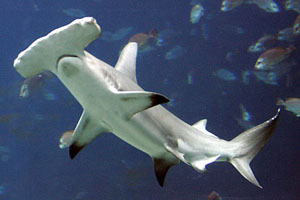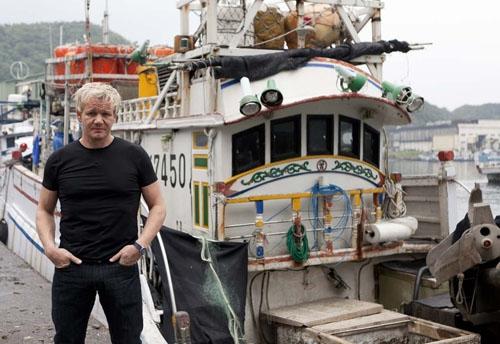With such weighty gastronauts as Heston Blumenthal, Jamie Oliver and Hugh Fearnley-Whittingstall all aboard Channel 4's Big Fish Fight jamboree, Gordon Ramsay obviously couldn't bear to be left standing on the quay. In fact, with Gordon Ramsay: Shark Bait he has made the most provocative film of the season, a punchy documentary in which the shouty superchef did some bold poking about in the hideous innards of the global trade in shark fins.
Shark-fin soup used to be a delicacy reserved for Chinese emperors, but has subsequently grown into a staple of Chinese restaurants and even street vendors. A top-end bowl of shark-fin soup can cost you 200 quid. But why does anyone eat this stuff, Ramsay wondered? On a trip to Taiwan, a major centre of both the shark-fishing industry and shark-fin consumption, culinary sleuth Ramsay barged into a restaurant kitchen and investigated the ingredients of the revered dish. The fin is left to infuse in chicken stock until it becomes gelatinous, then it's added to a broth flavoured with ham and soya sauce and boiled in a clay pot. Add bamboo shoots and coriander and consume. "It's really pretty bizarre", Ramsay concluded, "because it actually tastes of nothing."
'It's without doubt the worst act of animal cruelty I've ever seen,' said the appalled chef
However, the insatiable Chinese appetite for nothing soup has led to the development of a vast industry which is systematically emptying the oceans of sharks. Amid a spattering of hair-raising eco-statistics, we learned that in some areas shark populations have seen a 90 per cent decline in less than a decade. There was an inkling of the scale of the carnage when Ramsay, defying shadowy figures tipping gasoline over him from above, shouldered his way onto a Taiwanese rooftop to find a panorama of shark fins drying in the sun. Their combined value could only be guessed at. "Fuck me!" exclaimed Ramsay, whose language throughout was appropriately seaman-like. "Let's get out of here before we get shot."
He was apparently threatened at gunpoint when he went to Costa Rica, where sinister private companies have built their own fortified docks solely for shark-fin processing, but the scene wasn't in the film. Frankly, Ramsay is lucky not to be threatened at gunpoint on a daily basis, but that's another story. The private docks were seemingly a way to circumvent local laws forbidding the landing of fins but not the concomitant sharks, introduced to curb the vile practice of "finning" them and chucking the mutilated bodies back into the sea, still alive. The bodies have no commercial value, which means 95 per cent of each shark is discarded. Ramsay had acquired footage of hammerhead sharks being finned, which, inevitably, was utterly sickening. "It's without doubt the worst act of animal cruelty I've ever seen," said the appalled chef (hammerhead shark in its natural habitat, pictured below).
 If there was a slight whiff of the late-to-the-party zealot about Ramsay's shark crusade, at least he's getting out there and using his reputation and his bellicose attitude to try to whip up some positive action. Back in London, he convened a meeting of restaurateurs from London's Chinatown and showed them what he'd found. Four restaurants subsequently agreed to take shark-fin soup off the menu, but one ranting superchef is unlikely to make much of a dent in the wider Chinese consciousness, in which the concept of animal welfare doesn't exist.
If there was a slight whiff of the late-to-the-party zealot about Ramsay's shark crusade, at least he's getting out there and using his reputation and his bellicose attitude to try to whip up some positive action. Back in London, he convened a meeting of restaurateurs from London's Chinatown and showed them what he'd found. Four restaurants subsequently agreed to take shark-fin soup off the menu, but one ranting superchef is unlikely to make much of a dent in the wider Chinese consciousness, in which the concept of animal welfare doesn't exist.
It isn't only sharks which have fallen victim to the world's insatiable lust for seafood. Dispatches: Fish Unwrapped paraded some stomach-turning facts about what you're really eating when you think you have a mouthful of fish. Scampi may very well turn out to be "reformed scampi", assembled from fishy scraps glued together with Sodium TriPolyphosphate. Mmm! Prawns farmed in Bangladesh (and widely sold in the UK) might have been reared on a diet of raw sewage and pesticides, and then had their weight inflated with "bulking liquid". And beware of that "fresh fish" sign in the supermarket - "fresh" could actually be a euphemism for "frozen nine months ago". Eating only home-grown vegetables is beginning to look like the only truly safe, not to mention humane, option.















Add comment